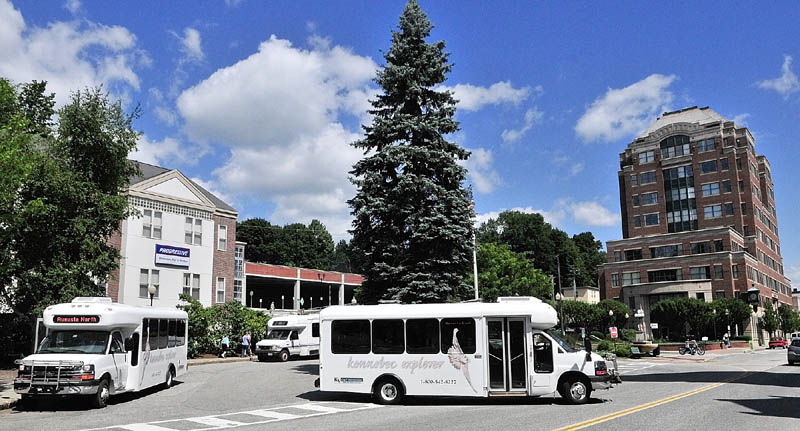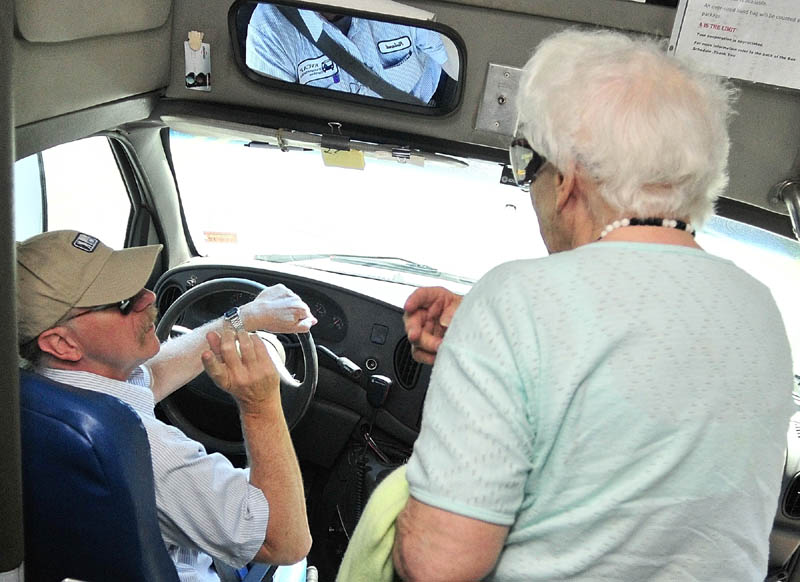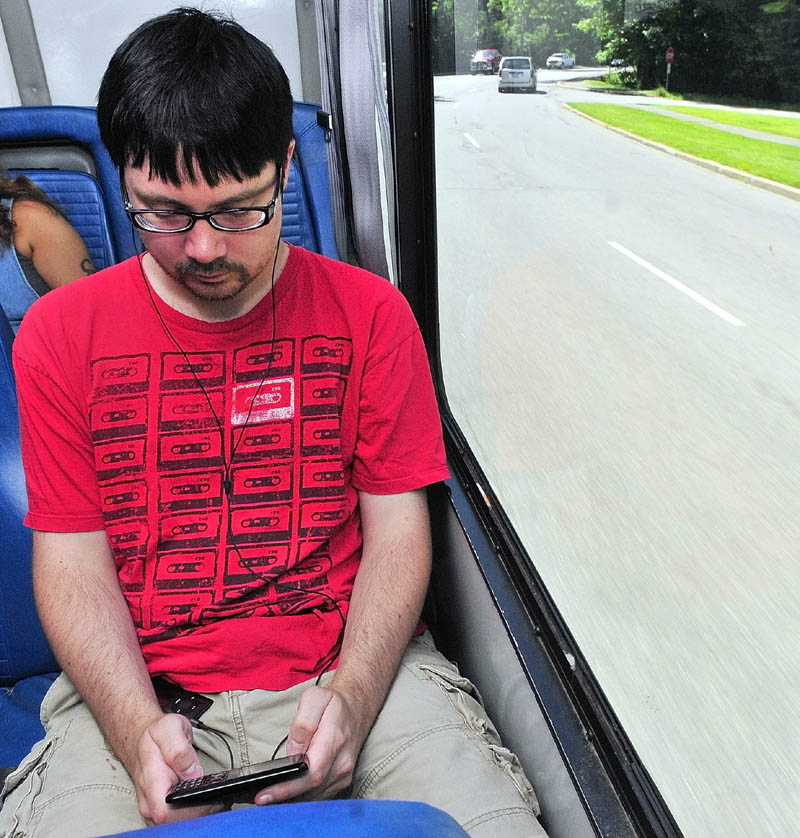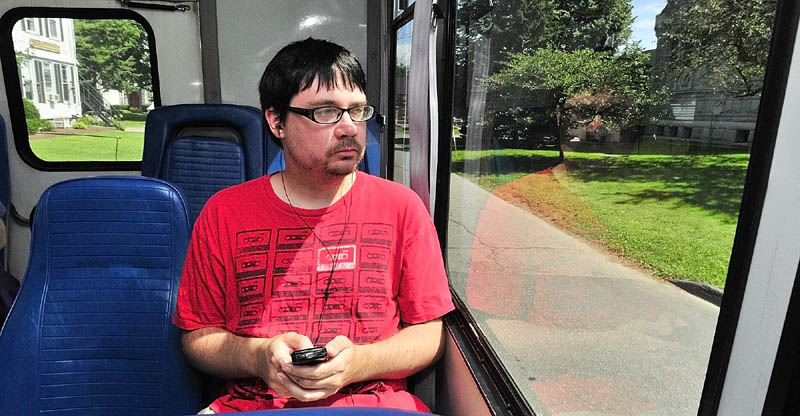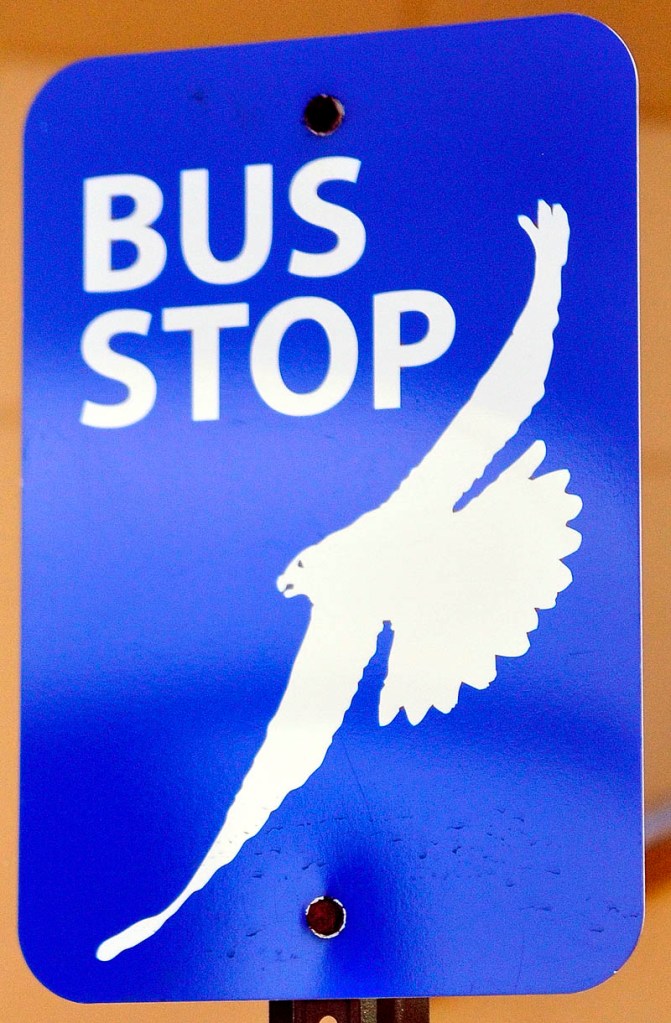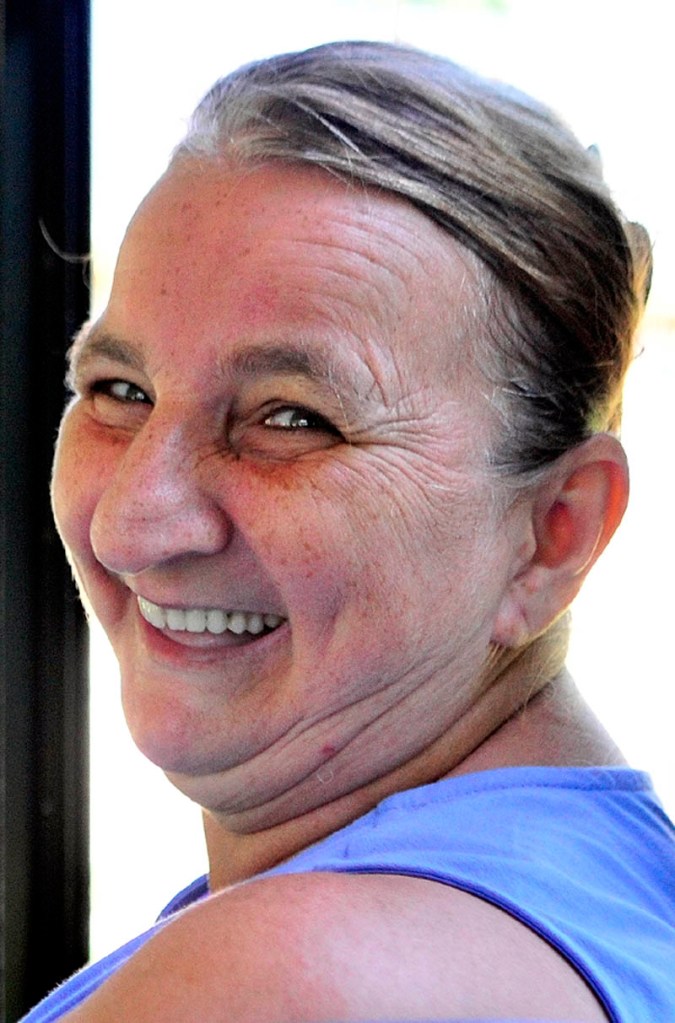After his car quit last winter, Mike Morisette, of Augusta, turned to the Kennebec Explorer.
“It’s cheaper than a taxi,” he said, heading up on the north Augusta bus to meet his wife at Walmart. “It’s very convenient right now.”
On each 40-minute one-way trip on the Waterville-Augusta line, Kennebec Explorer buses pick up and drop off people in city centers and at major medical facilities.
The buses are clean, the seats comfortable and the views largely green along Interstate 95.
There’s even music, provided by a local radio station.
For Fay Scholz of Hallowell, whose relatives are all out of state, the public transit system provides a lifeline.
One recent day, she boarded outside her Cotton Mill Apartment home, rode through Gardiner and got off carefully, using her cane to help her balance, just where she requested — outside her doctor’s office on Glenridge Drive on the east side of Augusta.
“This is a godsend,” Scholz said.
Riders pay $1 to go anywhere in the city, and $1.25 to travel between Augusta, Hallowell and Gardiner.
For $3, you can travel the 20 miles between Augusta and Waterville. Regular service linking the two largest cities in Kennebec County started in February.
For no additional cost, those travelers can also go as far north as Fairfield by transferring in Waterville.
To beat that deal at current gas prices, your vehicle would have to get nearly 40 miles per gallon — never mind costs for parking, insurance or maintenance.
But is public transit sustainable in central Maine, with its vast spaces and predominantly rural work force?
For now, fares, contributions from private and public organizations, state money, and substantial federal dollars all keep the wheels on the bus turning.
But Richard Rothe, of Rothe Associates in Hallowell, said rural transit systems such as the Kennebec Explorer will always require public funding.
“The expenses are too great and ridership not high enough,” he said. “In bigger cities like Boston, you get closer to critical mass (becoming self-sustaining).”
Throwback, and forth
Step aboard the Kennebec Explorer and experience a throwback to yesteryear. The buses travel some of the same routes as the old trolley and street cars that once patrolled a tree-lined Western Avenue.
Some riders say it’s their only means of travel. Others say they prefer the bus to the cost of running their own car.
Scholz, like the other regular riders, memorizes the schedule. She said she travels to her hairdresser’s in Gardiner every other Wednesday and uses the bus for all her weekday errands.
Her only complaint: “I wish they had more buses on this run.”
The busiest days, according to frequent traveler Donna Bennett, of Augusta, are the first few days of the month when Social Security money arrives.
She said she rides almost daily, exchanging first-name greetings with many passengers; and is a fan of the bigger, quieter, gasoline-powered buses that debuted in February.
When the air conditioning melted down one hot day on a new Explorer bus, an older Kennebec Transit bus was pressed into service.
“The older buses are diesel, and over the years they developed a few rattles and squeaks,” driver Roland St. Pierre said, over the clanking of the folded metal wheelchair ramp. A special design allows wheelchair users and others to roll directly onto the newer Explorer buses.
The potholes and summer road construction made the trip even more exciting — and bumpy — than usual.
“Are you playing dodge ’em?” Scholz asked after a swerve on Northern Avenue in Farmingdale.
The drivers are friendly and helpful, and St. Pierre at one point halted the bus for several minutes in the parking lot at Lithgow Public Library in Augusta to explain to a potential passenger where he could catch a bus to Togus.
Jean and Cliff Shaw of Farmingdale boarded at the end of their driveway. The bus is their only transportation, Jean Shaw said.
Cliff Shaw alit briefly at the Farmingdale Town Office to buy a fishing license, and St. Pierre picked him up again en route to dropping off another passenger who was heading to work.
It’s door-to-door service when the drivers can manage and the schedule allows.
The 16-passenger Kennebec Explorer buses — each with the large peregrine falcon logo — carry bikes on racks fitted to the front as well. The older buses lack this feature, which appeals to students as well as those who prefer to bike rail-trails one way and catch the bus for the ride back.
Ronald James, of Pittston, said he uses the bus to commute to his job on Western Avenue in Augusta.
“It’s more affordable compared to a car,” he said. “It’s saves me money on gas, and it’s more comfortable because I don’t have to drive. The drivers are all nice and courteous and you can even transfer from bus to bus within an hour.”
Aaron Lowden of Augusta was the lone passenger picked up at the University of Maine at Augusta bus stop on a recent summer day, but said the route is more popular during the fall and spring semesters.
Students use their ID cards as free passes when their trip starts or ends at the university.
On the modern buses as opposed to the trollies, the stops may be less frequent, and the passengers more casually dressed, but the intent is the same: getting people where they need to go.
Roll the numbers
There are six Kennebec Explorer buses in all. Four are based in Augusta.
The program’s approximate $500,000 annual budget comes from several sources, including these Kennebec County municipalities:
* Augusta $20,000;
* Waterville, $6,100;
* Gardiner, $3,750;
* Fairfield, $2,500; and
* Hallowell, $1,800.
Fares are budgeted to contribute $60,000 to the system.
But all those sources are dwarfed by the $331,517 annual federal subsidy. The state of Maine also kicks in $42,100 per year.
As a major and perhaps durable source of funding, it’s private companies that have been the best friends to local public transit.
Kennebec Explorer received $89,350 this year from private concerns, with $40,000 from MaineGeneral Medical Center — the county’s largest private employer — making up almost half that figure.
The hospital has many reasons for supporting the program, said Chuck Hays, president and chief operating officer of MaineGeneral Medical Center.
“We wanted to have an energy-efficient way that staff, patients and visitors could get to our services that didn’t require people to take their own vehicle,” Hays said. The medical center also saw value in being able “to serve the low-income people who don’t have a vehicle, and to connect the Waterville and Augusta service area.”
Hays said hospital officials had been looking at setting up a system to link its facilities when they learned about the Kennebec Valley Community Action Program plan to provide regional transit.
“The timing was perfect where we could help contribute to that plan,” Hays said. “With the Explorer, we could be part of a bigger transportation system and address a bigger need, which is public transportation in the region.”
Hays said he expects ridership to and from the medical facilities to increase significantly once the new regional hospital opens in north Augusta — previously estimated as early as the fourth quarter of 2013 — and the hospital’s contribution to the Kennebec Explorer program will increase to $90,000 at that point.
Other contributors to Kennebec Explorer are Inland Hospital, University of Maine at Augusta, Mid-Maine Chamber of Commerce, Marden’s in Waterville, local veterans’ groups, the Augusta Boys and Girls Clubs, and the Alfond Youth Center in Waterville.
Molina Health Care, which operates Molina Medicaid Services on Water Street in Augusta, pays $15,000 to underwrite an entire Kennebec Explorer bus route that travels between parking areas in downtown Augusta between 6:45 and 8:30 a.m., and between 4:30 and 6 p.m.
“It offers people a safe way to get to and from their cars without slips and falls,” said Jim Wood, transportation director at KVCAP, the Kennebec Valley Community Action Program, which runs the bus service.
Ridership on the shuttle route averages more than 250 a month since the service’s start in December.
Molina employees get bus passes; others can board for 50 cents.
Funding from youth organizations is meant to provide school children a safe ride home from after-school activities.
Wood feels like he has a solid revenue base in the infirm, the elderly, students and employees to continue operating the system.
“For many years, we’ve relied on municipalities to cover the local share,” Wood said. “Now we rely a lot more on hospitals and private businesses to take care of that local match. We actually apply farebox revenue to operating expenses before we draw down any state or federal funds.”
The annual budget for KV Transportation Services, which serves Kennebec and Somerset counties, is $6.4 million.
That includes the $500,000 for the public Kennebec Explorer.
Separately, KV Transportation also provides:
* a van service that is the MaineCare transportation provider,
* a paratransit van and volunteer driver services,
* the Department of Health & Human Services Friend & Family Driver program and
* money for cab rides.
Exploring the area
“Ridership has been very good,” Wood said, pointing to five months of statistics showing a relatively steady increase on the intercity Augusta-to-Waterville route, which he said was introduced in response to rider demand.
The intercity link — which has scheduled stops at Concord Trailways’ Augusta terminal — was added when the public transit service formerly known as Kennebec Transit became Kennebec Explorer five months ago.
“We’ve provided over 1,025 rides between Augusta and Waterville,” since the February debut of the line, he said.
Kennebec Explorer had its best month in March.
“In March, when gas prices were very high, we set a record,” Wood said.
The service carried 4,757 passengers that month — its second month of operation. That figure includes all Augusta and Waterville buses, including shuttle runs in downtown Augusta, and Boys/Girls Club routes.
The current daily average per bus is 48 riders.
The Explorer name will be familiar to those who see the Brunswick Explorer; the Island Explorer, on Mount Desert Island; Shoreline Explorer in York County; and the seasonal Mountain Explorer in the Bethel area, and Sugarloaf Explorer in Carrabassett Valley.
It’s part of a state Department of Transportation initiative to unify the image of bus service throughout the state.
Wood said the aim is “to allow anybody to come to Maine without a car and get around.”
Penny Vaillancourt of the state transportation department’s Bureau of Transportation Systems Planning, said the Explorer bus program is designed to serve the public at large with a “curb-to-curb, fixed-route service.”
“This is an attempt to appeal to the greater population, shoppers, commuters,” she said. “It’s truly for the public. In addition to the traditional use of transit for rides to medical appointments, the hallmark or success of the Explorer branding is that it appeals to the greater public to use transit services to shop, commute, visit, and connect to other modes of transportation.
“The Explorer system is also a success story to public/private partnerships in that it provides an opportunity for sustained funding and support to come from businesses, nonprofit organizations and municipalities as the federal/state funding levels are at times limited and/or non-existent,” she said.
One drawback of the Kennebec Explorer is a lack of weekend and night service. The regular bus service stops between 5 and 6 p.m. and does not run on weekends or holidays.
David Rand, 30, of Augusta, voiced that complaint at a regional transportation planning meeting held in May in Waterville.
“We need to get out on weekends to do grocery shopping,” Rand said. “We could use the bus not just during the day but on weekends, too.”
When there’s no bus service, he said he depends on his parents for rides or takes a taxi.
Wood said some weekend bus service is tentatively planned for later.
“We will assess it going forward,” he said. “We still don’t have economies of scale we could use to justify extending our services.”
But Wood predicts more public transit users in the future, as the average age of Maine’s population continues to increase, along it seems, with the price of fuel.
“Many of the people who are currently able to operate independently are going to become public transit-dependent people,” Wood said. “We want to try to build the resources so they’re there when they need them.”
Betty Adams — 621-5631
badams@centralmaine.com
Send questions/comments to the editors.


